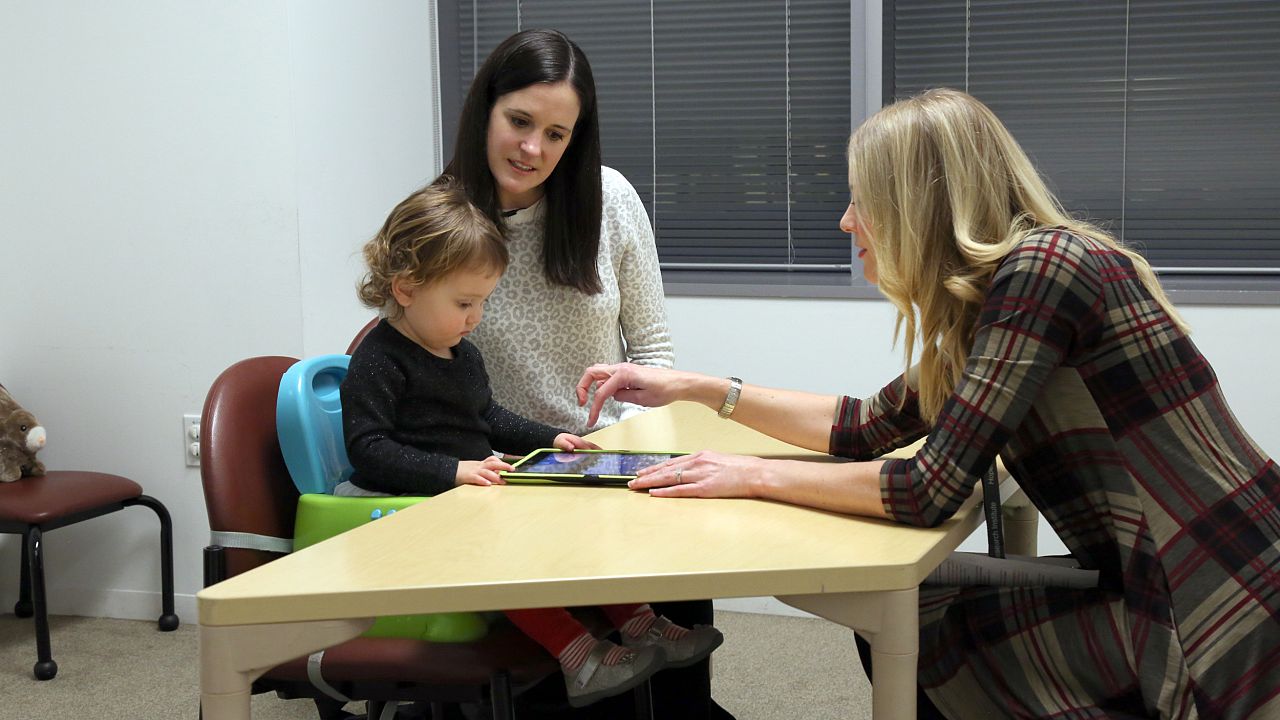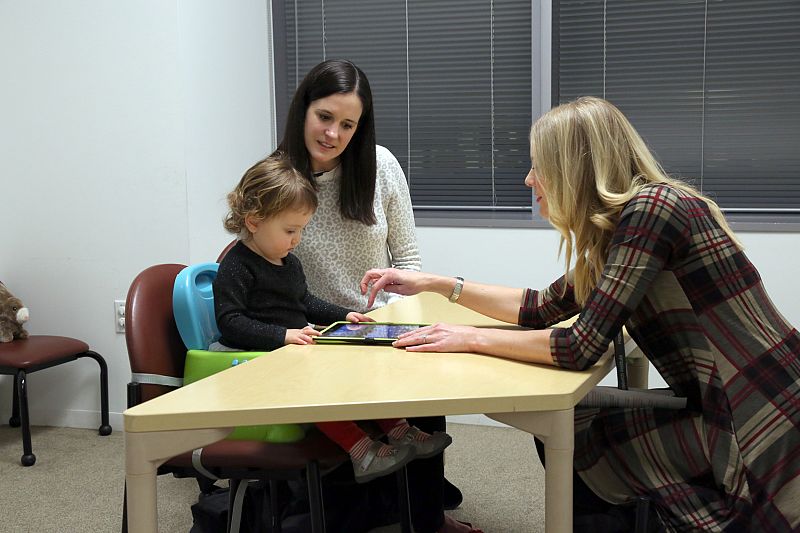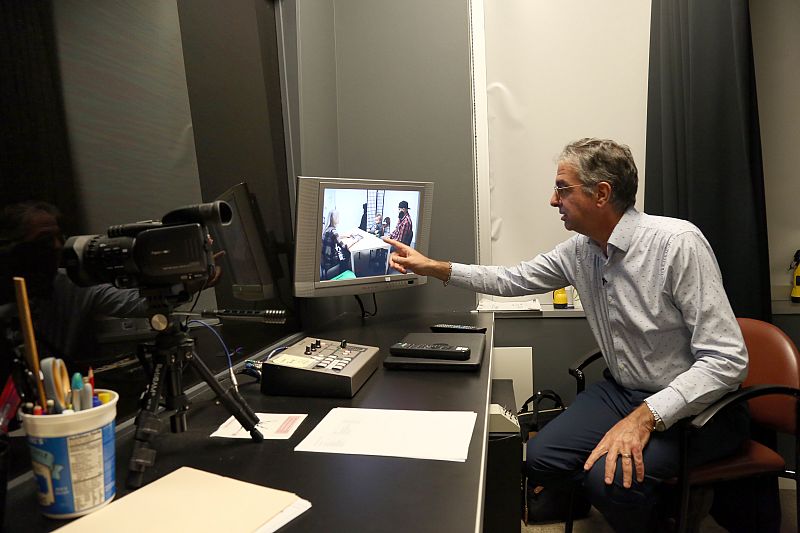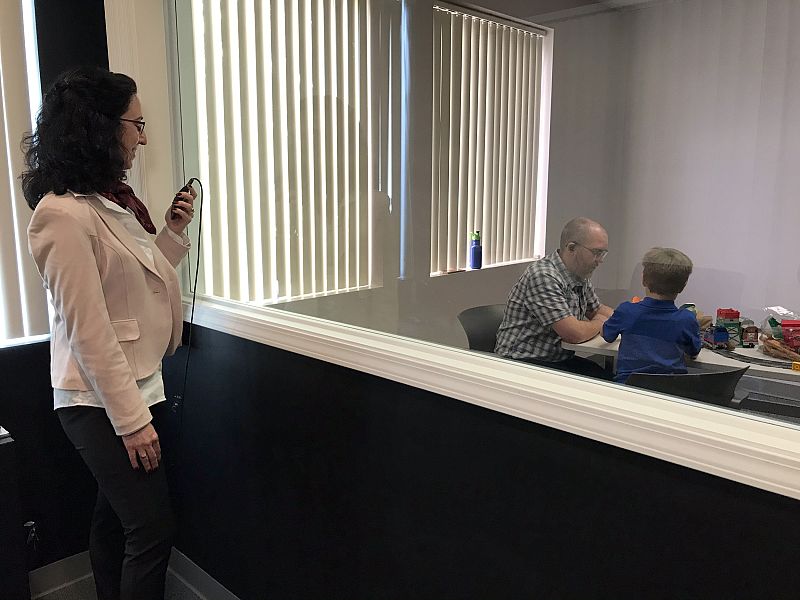Is your child hooked on digital devices? These researchers hope to help.

SEATTLE — Inside a lab at Seattle Children's Research Institute, 22-month-old Maggie Harbison played with a brightly colored puzzle, as her mother and a researcher looked on.Suddenly, the researcher, Sarah Corrigan, pointed to the corner of the room and said, "Look!"Instinctively, Maggie gazed in the direction in which Corrigan was pointing.Corrigan asked Maggie, who was part of a demonstration for NBC News of an upcoming study on children and digital devices, to give back the puzzle she had been playing with, which she did. Then Corrigan gave Maggie other toys but again interrupted her, asking her to look across the room. Each time, Maggie looked up when prompted.Later, Corrigan handed Maggie a tablet and opened her favorite app: Elmo Loves ABCs. Maggie started coloring in letters on the app. As her little fingers slid across the screen, the researcher again pointed across the room and called out, "Look!"This time, Maggie didn't flinch. Engrossed in the app, she showed no signs of hearing the command that she had responded to each time before.Researchers are hoping to measure these kinds of reactions to determine which children are most likely to become addicted to digital devices, and to create a standard set of questions that pediatricians across the country can ask parents to gauge whether children are showing signs of compulsive screen use.For young children like Maggie, ignoring an adult is unusual."They're overriding what's a really strong instinct to look," said Dimitri Christakis, the leader of the study and the director of the research institute's Center for Child Health, Behavior and Development. "It's a sign that whatever they're doing now is much stronger than their natural instinct."

Christakis' work comes as families wrestle with how much screen time is too much. But instead of focusing only on the number of hours kids are spending glued to digital devices, Christakis and others are looking for qualitative measurements of the devices' impact: When youngsters are on their phones, do they hear their parents call them to the dinner table? Do they willingly give back the devices when they are told their time is up? Does their compulsive use of the device disrupt their sleep?Christakis' research suggests the problem can begin as early as infancy."The important part of this research will be to see if we can identify a tool to help parents recognize when their children might be at risk for digital addiction," he added. "And it will hopefully lay the groundwork for future studies to help develop prevention and treatment strategies."The research is part of a larger public health effort to come to grips with the effect that digital devices have on children and adolescents.The majority of parents feel they need to curb their children's smartphone usage. Perhaps for good reason: More than half of American children own a smartphone by the age of 11. By age 2 , kids are spending as much asthree hours each day on a screen. That far exceeds the American Academy of Pediatrics' guidelines for how much screen time is age-appropriate. And a new study released earlier this week suggests that young children who spend three or more hours30424-9/fulltext) on a device each day may wind up leading more unhealthy lives.But weaning children — and adults — off their digital devices is not easy, especially when smartphones and apps are designed to be addictive.

"The typical 18- to 24-month-old will spend on average 20 to 30 minutes with their favorite toy, whether it's blocks or books or dolls or trucks," Christakis said. "We know now that children will happily spend much, much more time with iPads, with touchscreen media."Christakis is part of a burgeoning movement to address the issue.At Central Michigan University in Mount Pleasant, Michigan, psychologists Sarah Domoff and Larissa Niec have adapted a decades-old family therapy technique to coach parents on how to limit screen use. The technique, parent-child interaction therapy, or PCIT, is an approach that has been used for a variety of behavioral issues in children and at-risk families, such as ones in which a child is reconnecting with a parent who has been recently released from incarceration.The technique centers around strengthening the parent-child relationship and then teaching the parents effective discipline skills. The skills are practiced at home and then applied under the watchful eye of a therapist, who observes the parent interacting with their child through a one-way mirror. The parent wears an earpiece through which the therapist provides live coaching and feedback.Domoff and Niec believe this to be the first time PCIT has been used for parenting skills around screen-time limits, and are studying whether it can be an effective therapy for families struggling with children who can't break away from technology."It's really focusing on taking what we know works for managing child behaviors in other contexts and applying it to these new contexts that parents are facing today," Domoff said.The psychologists emphasized that bonding with children first and establishing a loving atmosphere in which the children know that they are the center of parental attention is the first step. Then, effective limit-setting can take place.Giving a warning, such as "OK, it's about time for us to go to this next activity," helps, Domoff said. This also gives parents time to find a natural stopping point in whatever the child is watching or playing to make it easier to pull them away, she added.She said there is no shortage of families coming to them, and those who have tried their program say they are pleased with the results.

Heather and Dru, a Michigan couple, realized their 6-year-old son, Jericho, had a screen addiction when his meltdowns escalated out of control. After being forced to turn off devices, Jericho got so angry, he would throw rocks at windows from the family's backyard.The family, who asked NBC News not to use their last name to protect their son's privacy, underwent a 13-week training course with Domoff and Niec.Heather and Dru said the course benefited them all. Jericho now gets an hour of screen time after school each day — but when it's time to turn it off, he does so without protest.Earlier this week, the family returned to Domoff and Niec's lab to show them the progress Jericho had made. They set him up with a video to watch on a smartphone. When it was time to stop watching, Heather kissed her son and told him, "We're going to give it another minute and then we're going to move on to the next thing, and we're going to play a little bit more, OK?"When she took the phone away, Jericho didn't object. Instead, he leaned into his mom and gently kissed her on the shoulder.It's progress for the family, but they admit it hasn't been easy. Like many other parents, Heather and Dru used to rely on tablets and other devices as a "digital babysitter" for their son — something to distract him while they did dishes. The change in Jericho has helped them realize the chores can wait."The dishes will still be there. They don't really care if they're done or not, and I need to spend that time with him first, fill up his bucket," Heather said. "It makes the rest of the day, the rest of the week so much better, because he's filled up."In Seattle, Maggie's mother,Katie Harbison, a research assistant in pediatric nephrologyat Seattle Children's Hospital,feels the same way. During the half-hour screening with Christakis that Harbison volunteered Maggie for, she noticed that the longer her child played with her Elmo app, the harder it was to get her attention. Normally, Maggie gets her Elmo app during airplane rides or special occasions, but the family is trying to keep her digital use to a minimum otherwise.Christakis said he believes some children are more at risk for compulsive digital media use than others. He compared it to alcoholism, which only certain people have a genetic predisposition for developing."The fundamental difference though is that unlike other addictive substances, we mandatorily expose everybody to a huge amount of digital media starting at a very, very young age,," he said.But parents don't necessarily have to try to avoid screen time altogether, he said. He hopes his research will identify children who are likeliest to develop a problem."We're trying to help find them," he said, "Finding the population that's at risk so we can help parents set parameters early."NBC News' Jacob Ward and Chiara Sottile reported from Seattle and Mount Pleasant, Michigan. Elizabeth Chuck reported from New York.